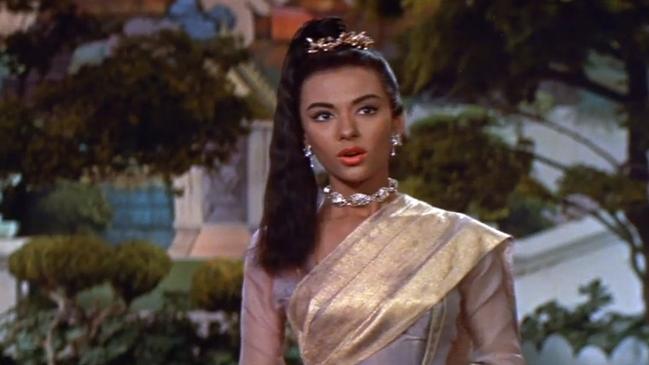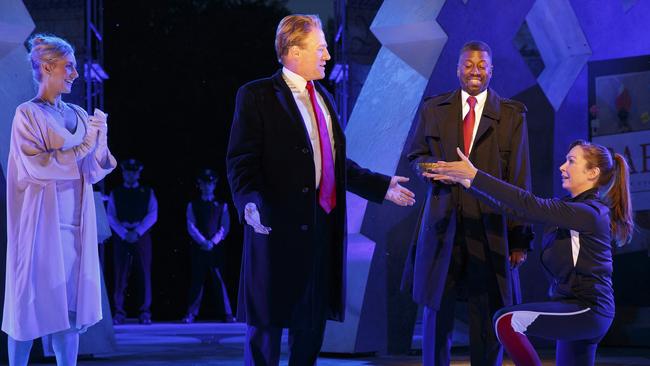Anti-‘yellowface’ forces disrupt revival of Jerome Robbins’ Broadway
Artists outraged by the idea of a white actress playing an Asian, shouted ‘no yellowface’ during a performance of The King and I.

Culture War II, in which “woke” progressives are pitting themselves against old-fashioned liberals, came to St Louis last month. The battleground was the Muny, a century-old outdoor theatre that produces Broadway musicals every summer, and the casus belli was — unlikely as it may sound — an anti-slavery ballet.
The Muny opened its centennial season last week with the first revival anywhere of Jerome Robbins’ Broadway, the 1989 revue in which the master of musical-comedy choreography put together an evening’s worth of his celebrated production numbers.
None was more memorable than The Small House of Uncle Thomas, the ballet from The King and I in which the enslaved wives of the tyrannical King of Siam turn Uncle Tom’s Cabin into an impeccably liberal-minded song-and-dance number that pointedly hints at the resemblance between their degraded condition and that of the black slaves on plantations in the American south.
First seen in the original 1951 stage production, Robbins’s ballet was included in the 1956 film version of The King and I and continues to be seen in revivals. (It was restaged to sumptuous effect, for example, in the 2015 production at New York’s Lincoln Centre.)
Laura Jacobs, who reviewed the Muny’s Jerome Robbins’ Broadway for The Wall Street Journal, singled out The Small House of Uncle Thomas as “the most beautiful of the numbers” in the revival.
But that’s not how a group of out-of-town American theatre artists felt when they saw it on Friday. Jeremy D. Goodwin, who interviewed them afterwards, reported on St Louis Public Radio’s website that the 15 artists, who were in town for a conference, were offended by what they took to be examples of cultural insensitivity in the production, the most noteworthy of which was the casting of a white actress, Sarah Bowden, as Tuptim, the slave-wife who narrates The Small House of Uncle Thomas.
“Looking at that work was painful for us,” said Leilani Chan, artistic director of Los Angeles’s TeAda Productions. “We were just shocked.”
How did they respond? One might reasonably have expected them to request a meeting with Mike Isaacson, the Muny’s artistic director and executive producer, to discuss their grievances.
But according to Goodwin, the group had already been tipped about the “yellowface” casting (to use the now-common term for casting whites in Asian roles) of Tuptim. Hence they were inclined instead to immediate action, and when The Small House of Uncle Thomas got under way, they rose to their feet and started shouting “No yellowface!” and booing in unison before being escorted out of the theatre by Muny staff.
I was present at the performance and was astonished by the demonstration, which could easily have brought the show to a halt.
Time was when yellowface casting was commonplace, so much so that the role of Tuptim was played by non-Asian women in the original stage production and the film version of The King and I. (She was played by Rita Moreno, who is Puerto Rican, in Hollywood.) But it is now generally regarded as racially offensive and has fallen from favour: the Asian parts in Lincoln Centre’s revival of The King and I were played by performers of Asian descent.
Nevertheless, this has no bearing on whether the St Louis protesters did the right thing. To disrupt a public performance of a work of art for any reason whatsoever is an act of de facto censorship, one not far removed from mob rule. That is a principle behind which all artists, regardless of their political views, should stand firmly and proudly.

When alt-right protesters tried to stop a Shakespeare in the Park performance of Julius Caesar last August because the actor who played the Roman emperor was dressed up to look like Donald Trump, Oskar Eustis, the show’s director, issued the following statement: “Free speech for all, but let’s not stop the show.”
The Muny, by contrast, issued what amounted to an abject apology instead of standing behind its right to perform without disruption: “We will continue to welcome the lessons and the feedback that result from moments like this and apply them in a meaningful way as we move forward.”
This weak-willed response could easily have a chilling effect (to use a phrase beloved of the left back in the far-off days of conservative “culture war” attacks on the National Endowment for the Arts) on other theatre companies, leading them to say: “Gee, maybe we’d just do better not to perform The King and I at all.”

The day after the St Louis protest, a Trump supporter unfurled a “Trump 2020: Keep America Great” poster during the curtain calls for the Broadway production of A Bronx Tale, which was co-directed by Robert De Niro, who previously had made his own foul-mouthed opinion of Trump well known at the Tony Awards ceremony. Do you disapprove of what that man did? If so, why are you still willing to give a pass to the Muny protesters?
For if history teaches us anything, it’s that when protest gets out of hand, freedom — everybody’s freedom — is at risk.


